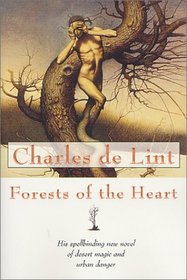Set in de Lint's imaginary modern American city of Newford (which seems a lot like Minneapolis to me, from the perspective of someone who's never been to Minneapolis...(it's cold, and it's not coastal)) tongue.gif
I have a feeling some of the characters have appeared in de Lint's other books as well, but I don't remember clearly enough to vouch for it.
Here we meet Bettina, a Mexican/Native American who's been brought up in the mystic healing traditions by her grandmother, and who has long had an ambivalent relationship with dog spirits.
Now, in Newford, a group of toughs who spend their time at the Irish pub, listening to Celtic music, drinking Guinness and beating people up, may be more than they seem... the 'hard men' are also known as 'los lobos' - the wolves, and they may be following an agenda of their own... a plan which may cast the spirit world into turmoil.
Bettina knows she must deal with the situation in some way...
Into this mess are (mostly unwillingly) dragged: Ellie, a sculptor and volunteer who works with the homeless; her volunteer partner, Tommy, an ex-alcoholic Native American; Ellie's ex-, Donal, a grumpy and depressed Irishman, Donal's sister, Miki, a cheery hippie-punk musician, her boss at a record store, Hunter; Miki's co-worker, the goth chick Fiona... and an assortment of other characters.
The plot centers around the 'hard men' and an art commission offered to Ellie that gets her into a prestigious artist's colony - but although the plot is fine, the book is more about spending time in de Lint's world, with his characters. He's consistently excellent as a writer at creating a social circle of people that by the end of a book, you feel you could be hanging out with later...
That said, I also tend to feel that he tries just a tiny bit too hard to have his characters be 'hip,' to include representatives of disenfranchised or marginalized groups, and to include plugs for musical groups that he likes. That last is particularly problematic - a writer can talk about the emotional impact of a song on his characters, but if he insists on *telling* you that the song is by Ani DiFranco, and you happen to personally think that Ani DiFranco is whiny and irritating, it just rather spoils the effect.
I have to also note, however, that de Lint does a much better job than nearly anyone else I can think of at writing fiction involving different ethnic spiritual traditions, and not having it come off as either cheesy or exploitative.
I have a feeling some of the characters have appeared in de Lint's other books as well, but I don't remember clearly enough to vouch for it.
Here we meet Bettina, a Mexican/Native American who's been brought up in the mystic healing traditions by her grandmother, and who has long had an ambivalent relationship with dog spirits.
Now, in Newford, a group of toughs who spend their time at the Irish pub, listening to Celtic music, drinking Guinness and beating people up, may be more than they seem... the 'hard men' are also known as 'los lobos' - the wolves, and they may be following an agenda of their own... a plan which may cast the spirit world into turmoil.
Bettina knows she must deal with the situation in some way...
Into this mess are (mostly unwillingly) dragged: Ellie, a sculptor and volunteer who works with the homeless; her volunteer partner, Tommy, an ex-alcoholic Native American; Ellie's ex-, Donal, a grumpy and depressed Irishman, Donal's sister, Miki, a cheery hippie-punk musician, her boss at a record store, Hunter; Miki's co-worker, the goth chick Fiona... and an assortment of other characters.
The plot centers around the 'hard men' and an art commission offered to Ellie that gets her into a prestigious artist's colony - but although the plot is fine, the book is more about spending time in de Lint's world, with his characters. He's consistently excellent as a writer at creating a social circle of people that by the end of a book, you feel you could be hanging out with later...
That said, I also tend to feel that he tries just a tiny bit too hard to have his characters be 'hip,' to include representatives of disenfranchised or marginalized groups, and to include plugs for musical groups that he likes. That last is particularly problematic - a writer can talk about the emotional impact of a song on his characters, but if he insists on *telling* you that the song is by Ani DiFranco, and you happen to personally think that Ani DiFranco is whiny and irritating, it just rather spoils the effect.
I have to also note, however, that de Lint does a much better job than nearly anyone else I can think of at writing fiction involving different ethnic spiritual traditions, and not having it come off as either cheesy or exploitative.
My friends LOVE this author. I found him a little bit hard to get into (see how honest I am?). But still, fascinating premise. Really interesting stuff.




